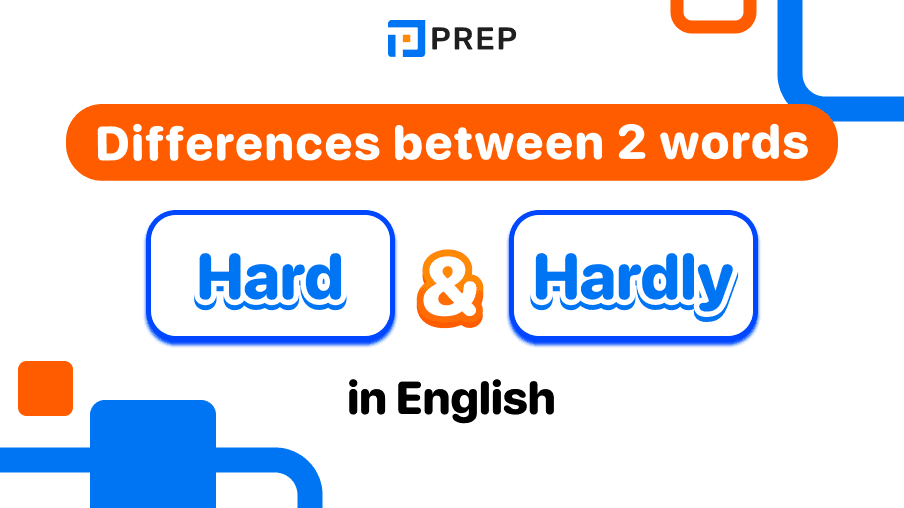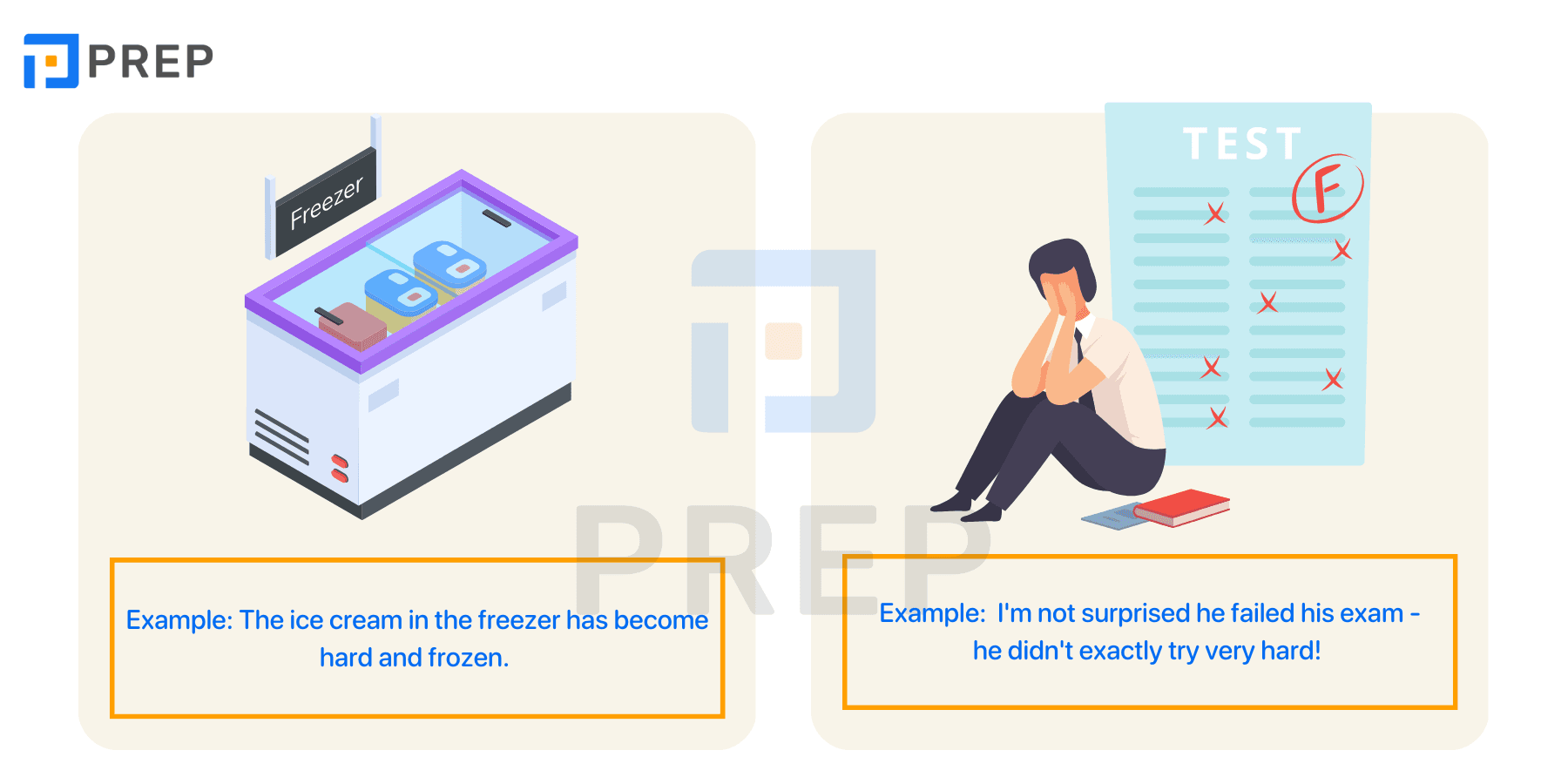Hard and Hardly in English: Meaning and Usage Guide
Understanding how to distinguish and use hard and hardly is essential for accurate and natural English communication. This overview clarifies their meanings, core differences, common structures, and expressions, with examples suitable for study, work, and exam preparation.

I. What’s the Difference Between Hard and Hardly?
At first glance, hard and hardly may look like related words, but in practice, they have very different meanings, grammatical roles, and usage in English. This distinction is crucial for learners, especially those preparing for English proficiency exams, where subtle differences in word choice can affect both clarity and scoring.
Hard - Can be used as both an adjective and an adverb
-
As an adjective: describes something difficult or firm. Example: "This task is hard."
-
As an adverb: means "with a lot of effort". Example: "She works hard every day."

Hardly - Functions only as an adverb. Means "almost not" or "barely" — expressing a very small degree or amount.
-
Example: "I hardly slept last night." (I slept very little)

Understanding the distinction between the two words can help avoid common learner mistakes. The table below provides a direct comparison:
|
Feature |
Hard |
Hardly |
|
Word type |
Adjective and Adverb |
Adverb only |
|
Core meaning |
Difficult (adj) / With effort (adv) |
Almost not / Barely |
|
Tone or polarity |
Positive, neutral |
Negative |
|
Example sentence |
"They worked hard to pass the exam." |
"They hardly studied and failed the exam." |
|
Position in sentence |
Often after verb or before noun |
Usually before main verb or auxiliary |
|
Common mistake to avoid |
"I study hardly" (incorrect) |
Correct form: "I study hard" |
Common Confusion
One of the most frequent errors among learners is using "hardly" when they mean "hard". For example:
Incorrect: "He studies hardly every night."
Correct: "He studies hard every night."
In the incorrect version, "hardly" actually means "almost not," which gives the opposite meaning from what was intended.
Learning the precise difference between "hard" and "hardly" is essential for using English naturally and avoiding misleading or unclear expressions in both spoken and written communication.

-
For a full guide to adverb types and positions, see adverbs in English.
II. How to Use Hard and Hardly Correctly
Once you understand the difference in meaning between hard and hardly, the next step is knowing how to use them correctly in real English. These two words often appear in academic writing, workplace communication, and everyday speech—but with completely different implications. Let’s explore their sentence structure, usage in common contexts, and frequently used expressions.
Basic Sentence Structure
Hard
-
As an adjective: describes a noun
-
Example: "This exam is hard."
-
-
As an adverb: modifies a verb, usually placed after the main verb
-
Example: "He worked hard to get a promotion."
-
Hardly
-
Only used as an adverb: expresses almost no amount, degree, or frequency
-
Typically placed before the main verb or auxiliary
-
Example: "She hardly spoke during the meeting."
-
Note: "Hardly" carries a negative meaning, but is not used with not.
-
Incorrect: "She didn’t hardly speak."
-
Correct: "She hardly spoke."
-
-
Usage in Different Contexts
-
Academic or professional writing
-
"The researchers worked hard to complete the experiment."
-
"There is hardly any evidence to support that claim."
-
-
Daily conversation
-
"You need to study hard if you want to pass."
-
"I hardly slept last night—I feel exhausted."
-
-
Emails/Discussion
-
"Thank you for your hard work on the project."
-
"We hardly had time to discuss the main issue."
-
Notice how "hard" brings a positive or effort-based tone, while "hardly" reduces force or frequency, adding a sense of limitation or contrast.
-
For a structured grammar review, consult learn English grammar.
Common Fixed Phrases and Expressions
Here are some frequently used expressions and idioms that use "hard" or "hardly":
|
Expression |
Meaning |
Example Sentence |
|
Try hard |
Make a great effort |
"She always tries hard in class." |
|
Work hard |
Put in a lot of effort at work/study |
"He works hard to support his family." |
|
Study hard |
To study intensively |
"They are studying hard for their final exams." |
|
Hardly ever |
Almost never |
"I hardly ever eat fast food." |
|
Hardly any |
Almost nothing/few |
"There was hardly any traffic this morning." |
|
Hardly had [I/he...] |
Used in inversions (formal structure) |
"Hardly had I arrived when the meeting started." |
These expressions help you sound more fluent and express both intensity (hard) and scarcity (hardly) in natural, native-like English.
III. Examples of Hard and Hardly in Real Sentences
Seeing how hard and hardly are used in actual sentences is one of the most effective ways to understand their proper usage. Whether in conversation, writing, or formal assessments, both words appear frequently — but with very different meanings and tones.
In Everyday Conversation
Hard (as an adverb – “with effort”)
-
"She works hard every day to support her children."
-
"You’ll need to study hard if you want to pass."
Hardly (as an adverb – “almost not / barely”)
-
"I hardly slept last night."
-
"He hardly knows anything about the topic."
These short sentences are common in daily English and often appear in informal speaking or messaging.
For guidance on pairing adjectives and nouns correctly, see common nouns and proper nouns.
In Academic or Formal Writing
Hard
-
"The team worked hard to meet the project deadline."
-
"This theory presents a hard problem in mathematical logic."
Hardly
-
"There is hardly any evidence to support the hypothesis."
-
"The government can hardly be expected to solve this alone."
In formal writing, hardly is often used to express limited amount, frequency, or possibility — typically in a neutral-to-formal tone.
For essay techniques that use varied grammatical structures, see IELTS Writing Task 2 tips.
In IELTS Speaking
Correct usage with “hard”
-
"I had to work really hard to finish my graduation thesis on time."
-
"I believe that anyone who works hard can achieve their goals."
Correct usage with “hardly”
-
"Honestly, I hardly go to the cinema these days because I prefer streaming at home."
-
"During the lockdown, I hardly saw my friends in person."
IELTS examiners encourage the use of a range of vocabulary. Appropriately using both “hard” and “hardly” can contribute to higher lexical resource scores, especially in Speaking Part 1 and Part 2.
By looking at these examples side by side, you can clearly see how "hard" focuses on intensity or difficulty, while "hardly" conveys a lack or limitation. Choosing the right word helps keep your communication precise, appropriate, and fluent in both spoken and written English.
IV. Practice Exercises for Hard and Hardly
Understanding the grammar and meaning of hard and hardly is just the first step. To use them correctly with confidence, you need targeted practice. The following exercises are designed to help learners internalize the difference through real examples, sentence building, and test-style questions. These activities are especially useful for self-study or exam preparation.
Exercise 1: Choose the Correct Word
Complete each sentence by choosing hard or hardly. Pay attention to grammar, meaning, and tone.
Example:
(1) She studies ___ every evening before her exams.
Answer: hard
-
I can ___ hear what he’s saying — the music is too loud.
-
He tried very ___ to make a good impression in the interview.
-
It was a ___ decision, but I had to make it.
-
We could ___ see anything in the heavy fog.
-
Anna works ___, and it shows in her results.
Exercise 2: Rewrite the Sentence
Rewrite each sentence using hard or hardly so that the meaning stays the same or becomes clearer.
Example:
Original: I almost didn’t sleep at all last night.
Rewrite: I hardly slept last night.
-
She puts in a lot of effort in every class.
-
There’s almost no food left in the fridge.
-
That test wasn’t easy at all.
-
He rarely talks at team meetings.
-
We worked with maximum effort all week.
Exercise 3: Identify and Correct the Error
In each sentence below, decide whether hard or hardly was used correctly. If it's incorrect, rewrite the sentence.
-
He hardly studies because he wants to pass.
-
They worked hard during the emergency.
-
She hardly smiled when she greeted us.
-
We study hardly on the weekend to relax.
-
I run hard every morning before work.
Consistent practice like this not only strengthens your grammar but also improves your ability to recognize the correct word based on tone, formality, and sentence structure — a key skill in both real-life communication and standardized tests.
Answer Key
[prep_collapse_expand open_text="View more" close_text="Show less"]
|
Exercise 1 |
Exercise 2 |
Exercise 3 |
|
|
|
[/prep_collapse_expand]
-
Try organising these words with an English vocabulary mind map.
The information above provides the clearest difference between Hard and Hardly that PREP has shared with you. We wish you effective study sessions at home and hope you achieve high scores in real exams like IELTS and TOEIC!

Hi I'm Chloe, and I am currently serving as an Product Content Administrator at Prep Education. With over five years of experience in independent online IELTS study and exam preparation, I am confident in my ability to support learners in achieving their highest possible scores.
Comment
Premium content
View allPersonalized roadmap
Most read












